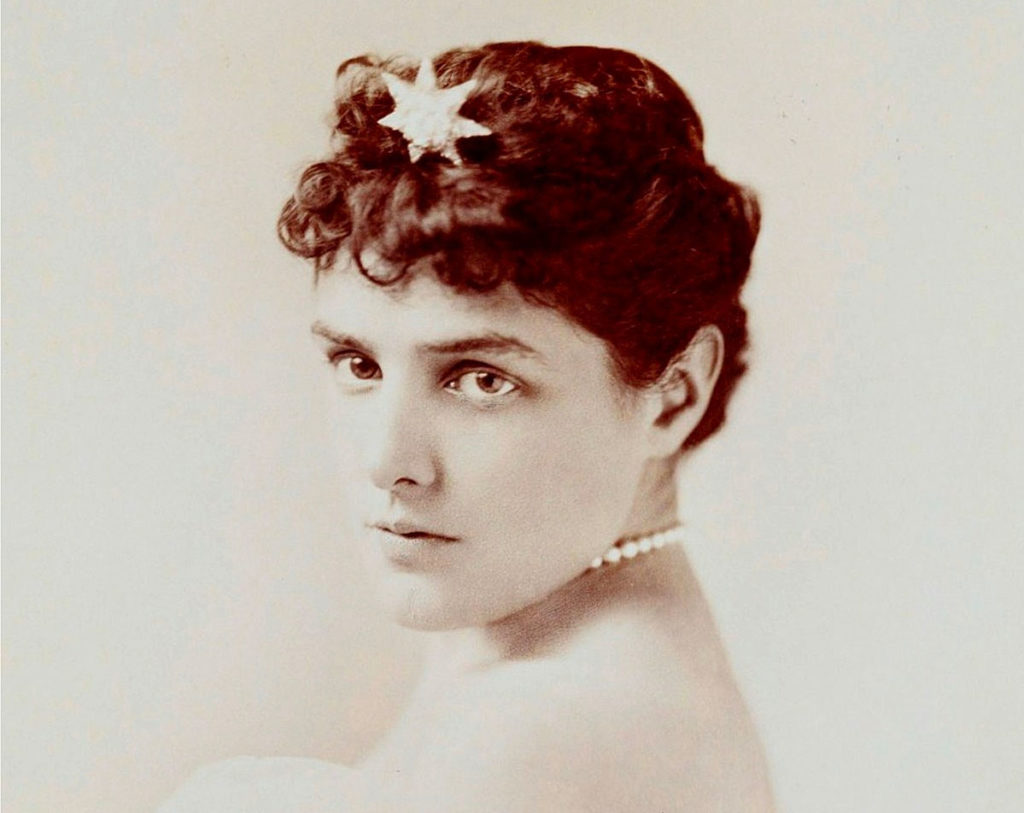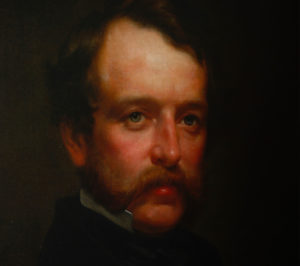Genealogy
Last Act: Montagu Porch

Jennie Churchill, née Jeanette Jerome, formally Lady Randolph Churchill (born 9 January 1854, Brooklyn, New York and died 29 June 1921, London, England). The wife of Lord Randolph Churchill and the mother of Winston Churchill
August 25, 2021
By A. R. Allen
A search for Lady Randolph Churchill’s obscure last husband turns up another relation who was “Faithful but Unfortunate”
ON 1 June 1918 the 64-year-old Lady Randolph Churchill married Montagu P. Porch, relatively unknown to Churchillians, whose fortunes were closely involved with the history of the Nigerian protectorate.1
Montagu was born in 1877 to Reginald Porch, the third son of the then head of the Porch family of Glastonbury, Somerset. Though there was clearly no question of Montie becoming head of the family, he undoubtedly belonged to landed gentry and had private means. He was educated in Bath and at Magdalene College Oxford, (MA1904).2 In 1900 he joined the Imperial Yeomanry as a trooper and served in the South African War. After that he joined the Flinders Petrie expedition 1903-04, looking for archaeological remains in Sinai.
In 1906, when his future stepson was Undersecretary of State for the Colonies, Porch applied to join the Colonial Service and was interviewed by Sir Edward Marsh, Churchill’s private secretary.3 He was appointed on 14th July 1906 and a year later was placed in charge of the division at Jema’an Daroro (later known as Old Jema’a) in Nassarawa Province (now part of Plateau State). Porch spent all his first tour until his trouble in this division, serving under four successive Residents who were stationed at the provincial headquarter in Keffi.

2025 International Churchill Conference
In his Annual Report for 1907-08 Sir Percy Girouard, Governor of Northern Nigeria, stated, “The Jema’an Daroro Division is backward and unsatisfactory, its principal tribe the very primitive and low type Kagoro.” Porch had been told to collect “tribute,” and did so with some difficulty. On several expeditions his detachment was fired upon; in one it sustained several casualties, one of the soldiers subsequently dying.4
After an investigation of these events Blakeney, the Resident, blamed Porch for using military force when it might not have been necessary. Porch responded that he had been given to understand that the tribute had to be collected at all costs among natives who had never really been brought under control. It is not difficult to find some sympathy for Porch in the situation, but Blakeney held him unsuitable and described him as “excitable, highly strung, nervous, disliked by the natives and unpopular with brother officers.” Blakeney said that he did not want Porch back in the province and recommended that he be terminated.
Sir Percy Girouard saw Porch in London on 28th April 1908 and decided that Montagu had misinterpreted instructions for dealing with pagan tribes, but had acted in good faith. Porch was allowed to return to Nigeria and was posted to the provincial office in Zaria. He was never again entrusted with the charge of a division, but seems to have done well, particularly at road-making. In later life he claimed5 to have built the “first town of Kaduna,” presumably the settlement created for the construction of the railway line.
In this period Porch built for himself a large house in traditional Northern style, near the Emir’s palace in the centre of Zaria City. He called it Gidan Babban Dodo, “the house of the big evil spirit.”6 It has since become a landmark.
In 1914 Porch was on leave in Britain when he met Jennie, Lady Randolph Churchill. They were introduced at a ball by her nephew, Hugh Frewen.7 A few weeks later they met again at Frewen’s wedding in Italy. The outbreak of the First World War found Porch back in Nigeria, where he was soon involved in military activity. Germans in the Cameroons had sent a few hundred men into the southeastern extremity of Northern Nigeria, and a company of troops was sent to drive them out. Porch accompanied the column as Intelligence Officer, attached Nigeria Regiment, in the rank of Temporary Lieutenant8. He was well reported on by the officer commanding. Afterward, Porch tried to enlist in the army, but he was not allowed to do so.9
On his next leave in 1916, he met Jennie again. By then he had fallen in love and determined to marry her. On leave in Britain again in early 1918, he travelled with Jennie to stay with her sister Leonie in Ireland, where they became engaged.10 Porch probably never expected Jennie to take his name and live in Africa. In later years he loyally maintained that his wife had applied to go to Nigeria, but had been refused permission because of the submarine peril.11 On the other hand, there is some evidence that he himself did not intend to return to Nigeria.
Colonial Regulations required that an officer proceeding on leave should report on arrival in Britain to the Crown Agents. Porch failed to report for seven weeks. When told by the Colonial Office to return to Nigeria on 9 May he replied that he had not known he had only three months leave expiring at the end of April.12 Meanwhile in March he had applied for permission to accept an appointment to the Hedjaz Mission, which was organizing the Arab revolt against the Turks. He claimed that he had no obligation to return to Nigeria, and failed to mention that his leave had expired.
The War Office wanted his services in Arabia but the Governor-General of Nigeria refused to release Porch because of a shortage of staff. Porch, meanwhile, was trying to find time for his wedding and a uniform in which to be married. Jennie’s second husband, George Cornwallis-West, and her two sons had been soldiers and she was determined to marry a soldier. Porch obliged by overstaying his leave and appearing at the Harrow Road Register Office in an officer’s uniform for his marriage to Jennie on 1 June 1918. In signing the marriage register he added after his name “Lieutenant, West African Frontier Force.”13
Eventually, newspapers and magazines with photographs of the happy pair reached Zaria, enraging the Commandant of the depot of the Nigeria Regiment, who threatened to prosecute Porch for wearing a uniform to which he was not entitled. Porch responded that be had been in effect an officer with the Cameroons column, and would have been an officer with the Hedjaz Mission had he been allowed to join it. He also explained his own excitement at his wedding and Jennie’s insistence.
While these matters were being considered Porch returned to Nigeria, only to face a further legal embroglio.14 A cook Porch had dismissed had gone to court, alleging that Porch had withheld his wages and indulged in homosexual behaviour. The charges were dismissed but Porch was incensed: On 24 February 1919 Porch accosted his accuser, demanding an apology. The cook fled, chased by servants who beat him with their hands. Porch was charged with assault, pleaded guilty, and was severely censured by the Colonial Civil Service.
By this time he had been transferred to Kontagora Province but the Governor15 wanted him to proceed on leave immediately. The Resident replied that Porch could not be spared,16 but pressure for Porch’s departure continued and the Resident finally recalled Joyce Cary17 from Yashikera Division to take over. The Governor stated that Porch should leave at once whether convenient or not. He sailed from Legos on 23 July, the Governor’s secretary having assured that he was safely embarked.
This was the end of Porch’s career in the Colonial Service although it is not clear whether he was compulsorily retired or resigned. Life in Britain with Jennie was expensive and irritating18 and in the spring of 1921, he returned to Africa on a commercial venture which took him to the Gold Coast (now Ghana). He was still there in June when Jennie fell and broke her leg. Tender correspondence occurred between them, Montie writing, “I have no one in the world but you…”19 Gangrene set in and the leg was amputated. This seemed to put her out of danger, but on 29 June a haemorrhage occurred and Jennie died.
In 1926 Porch married an Italian lady and lived in Italy until his wife’s death in 1938. He then returned to Glastonbury, where he lived in reduced circumstances until his death at 87 in November 1964.
References
1. The only published work giving prominence to Porch is Lady Randolph Churchill Vol II, by Ralph C. Martin, Cassell 1971. Jennie: The Life of Lady Churchill by Anita Leslie, Hutchinson 1969, has details of their meeting. Martin refers at length to Porch’s interview in the Daily Express, 21Dec59.
2. For biographical details see Burke’s Peerage or Burke’s Landed Gentry. The author consulted the 1921 and 1952 editions respectively.
3. Martin, op. cit., page 292.
4. The details of the Kagoro incidents and subsequent investigations and reports are to be found in the Nigerian National Archives, Kaduna, files 143, 169 and 174/19 under the classification SNP 6/3.
5. Daily Express interview quoted by Martin, op. cit., page 292.
6. The translation of”dodo” is from Dictionary of the Hausa Language by RC. Abraham. Crown Agents,1949, page 219. The possibility exists that “Babban Dodo” might have been G. W. Webster, who served with Porch in Nassarawa Province and Zaria.
7. Hugh Frewen, son of Moreton Frewen and Clara Jerome, was an Assistant Resident in Northern Nigeria 1908-13 and Private Secretary to the Governor 1908-09; see Burke’s Landed Gentry, 1952. For details of the meeting see Leslie, op. cit., pages 302-3.
8. Medal Index Card: WO 372, The National Archives, Kew, London
9. These details emerged later as part of his justification for assuming military rank (see below) and are found in NNA Kaduna SNP 8/5 file 96/1918 and SNP 8/6 file 32/1919.
10. Leslie, op. cit., page 333.
11. Martin, op. cit., page 300.
12. Correspondence about his leave and application to join the Hedjaz Mission is in NNA Kaduna file 7/1918.
13. NNA Kaduna SNP 8/5 file 96/1918. His entry in Burke’s Peerage, 1921 edition, maintains this rank.
14. These incidents are found in NNA Kaduna SNP 8/6 file 32/1919.
15. On the amalgamation of the protectorates of Southern and Northern Nigeria in 1914, Sir Frederick Lugard was appointed Governor-General but that title was personal to him, his 1919 successor, Sir Hugh Clifford, being simply Governor. The head of government in the Protectorate of Northern Nigeria and subsequently of the Northern Provinces was a High Commissioner from 1900 to 1914 and a Lieutenant-Governor from 1914 to 1932.
16. The saga of Montage Porch’s departure is to be found In NNA Kaduna SNP 8/6 file 64/1919.
17. Later the famous novelist.
18. “Better the mosquitoes of Africa than the pricks of London drawing rooms.” Porch, quoted by Leslie, op. cit., page 338.
19. “I love you very much…” Porch to Jennie, 25Jun21. Churchill & Mitchell, Jennie: Lady Randolph Churchill, St Martins 1974, page 219.
Subscribe
WANT MORE?
Get the Churchill Bulletin delivered to your inbox once a month.





